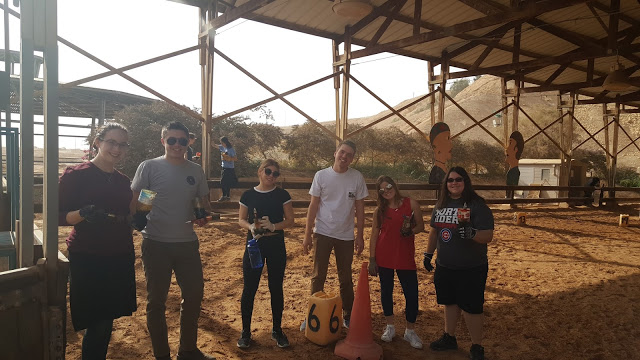Volunteers at Red Mountain Therapeutic Riding Center, located on Kibbutz Grofit. |
February is Jewish Disabilty Awareness Inclusion Month (JDAIM), and Jewish National Fund proudly supports efforts to make sure people with special needs and disabilities are fully included in Israeli society.
The trip along Israel's Route 90 includes views of sand, mountain terrain, and expansive vistas. Turn onto a small road toward the picturesque hills of Jordan and you'll also see a desert oasis filled with the smiles and laughter of hundreds of children and adults with special needs.
They come from all over the region to the Red Mountain Therapeutic Riding Center at Kibbutz Grofit.
“Horse therapy transcends the spectrum of all types of special needs,” says the center’s founder, Jill Oron. Participants come from all ethnic and religious backgrounds,and the services help those with social, cognitive, physical, and emotional disabilities.
Oron trained in the United Kingdom as a play therapist, a form of psychotherapy that uses play to help children develop stronger communication and interpersonal skills and overcome psychological or emotional trauma. Shortly after making aliyah at the age of 29, she took her love of play therapy to a new level and opened the Red Mountain Therapeutic Riding Center as a premier horse therapy center deep in the Arava.
Back then, the center had just 3 horses and only 15 participants. Now it boasts over 230 riders each week, with 21 horses, many born right at Kibbutz Grofit.
...
"We learned a lot by trial and error," Oron said of the success of the center's therapeutic services. "We have grown organically, in terms of our services, and continue to grow in size due to the growing population of the area." Indeed, individuals with special needs and their families find they require high levels of specialized social services, and the center’s work has attracted many to relocate to the area.

The program finds its greatest success matching riders with the most appropriate horse. For example, a rider with cerebral palsy who lacks strong muscular and mobility control will be matched with a horse that has a slower gait and a cadence that creates a complex physical reaction for the rider, allowing them to strengthen core muscle groups. Conversely, someone with hypertonia, or rigid and spastic muscle control, will be paired with a horse that has a much faster gait that relaxes the rider's muscles, allowing more flexibility and control.
At-risk youth have also benefitted from horse therapy. “We teach them to build confidence,” Oron says. “This is their little corner of the world where they feel they can succeed.”
However, unlike those with physical disabilities, these riders are matched based on the horse’s personality. When these teenagers arrive at the ranch, Oron makes sure they're calm before they even enter the barn. "We teach them to approach a situation with the right state of mind." By learning to control an aggressive horse, and calmly deal with their own situational awareness, it allows them more introspection into how they, in turn, deal with other people.
"None of this would even be possible without the support of Jewish National Fund," Oron said. "Eighty percent of our funding for scholarships and building projects have come from JNF donors."
More on Red Mountain
Happy days for boys with autism: How horses are changing my son's life
Moved and awe-inspired witnessing Israelis with special needs
Out of the 230 weekly riders, 190 are recipients of some kind of scholarship, allowing inclusion for all riders and lessening the burden on families to provide their children with these life-changing opportunities. While those living in Israel's bustling and congested central metropolis may only pass through this region on vacation, for those who have chosen to make this amazing region their home, the Arava's Red Mountain Therapeutic Riding Center is a beautiful respite from everyday life, and for every rider who receives therapy, it is surely a major highlight each week.


